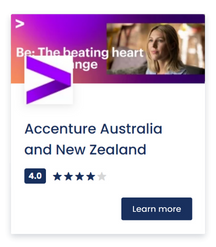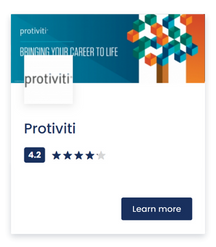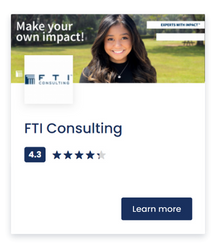What do consultants actually do?
Team Prosple
What consultants do really depends on the type of consultancy but broadly, if you’re working on a project or ‘case’, then the type of work you’ll do can be divided into three main buckets: research, analysis, and presentation of findings.
Work you might do when working on a case
Research
This is the time when you start to sift through all available information and decide what’s important (or not). Research doesn’t necessarily mean just googling things on your desktop (although there is definitely some of that) but may mean a range of things, like reading through reports, financial statements or interviewing your client and their customers.
As a consultant, you will typically work from a hypothesis. Rather than ‘boiling the ocean’ (a metaphor for going overboard and in this instance, doing endless amounts of research), a hypothesis-driven approach allows you to focus on proving (or disproving) a particular argument.
For example, got a hunch that your client should sell that side business that never makes any money? Well, first up, let’s see how that business is operating, how it makes money and what’s happening in the industry overall. Maybe you’ll find out that the business is actually sitting on a huge opportunity that they should take advantage of, stat. Alternatively, you may find out that yep, the business is sucking its parent dry and should be sold, dissolved and gotten rid of as soon as possible.
Either way, your hypothesis will allow you to hone in on what’s most important and provide parameters and focus for your research. After all, there’s no point in making your work unnecessarily difficult!
Research tasks may include:
- Learning about your client: who’s who, what they do and how they do it, how they make money (and if they are expected to continue to do so) and the challenges and opportunities they face. This research typically involves interviewing key stakeholders both within and outside of the organisation to get an insider’s view on what’s really making the place tick. You may also be required to collect client data including annual reports, financial statements and other strategic documents.
- Understanding your client’s industry: learning more about major players, trends, competitive threats, regulation and overall industry profitability. You may use investment banking reports or resources such as Bloomberg, media articles or interviews with industry experts. Some larger consultancies, particularly global ones, often have resources that you can access based on previous project experience or case studies.
- Distilling key insights. Once you have a solid understanding of your client and the industry, you are usually expected to share the key themes, trends and findings with your team and client. This is a great way to consolidate your own understanding and approach to solving your client’s problem.
Analysis
It’s not good enough for consultants to make recommendations off the back of their gut (even if they have excellent instincts!). It’s all about data and having the analysis to back it up. After all, that’s what you’re being paid to do.
For a typical strategy consulting project, once you have undertaken relevant research, it’s time to get your hands dirty and start opening up your excel spreadsheets. The analysis phase takes all the information you’ve collected and consolidates this to continue to prove or disprove your hypothesis. It forms the backbone of your final recommendations.
Analysis tasks may include:
- Aggregating data. Data, data, data! Whether it’s quantitative (think, basically anything to do with numbers like balance sheets or income statements) or qualitative (such as interviews and surveys), one of your key tasks, especially as a more junior consultant, is to find and then consolidate all required data. Some of this you may have from your research but otherwise could mean requesting specific client data, extracting data from industry research or internal firm databases.
- Analysing data. Once you’ve collated all your data, it’s time to begin making sense of what it all means. This is a finely-honed skill – and you should constantly be asking yourself what consultants like to call, the ‘so what?’. So, your data is saying that the retail industry is about to fall off a cliff because of the entry of a global internet retailer? So what? What does this actually mean for your client and what strategies should they put in place to defend their market position?Analysing data may require quantitative modelling such as creating a discounted cash flow (DCF) or other financial models using excel. If you’re involved in building quantitative models, it is important that you facilitate debate around the appropriateness of certain variable values both with more senior consultants on your team as well as your client. For example, do we all agree that this particular product line will grow in sales by 15 per cent, or is that 20 per cent? You may also be required to run a sensitivity analysis, which will give you further insight into what happens when a specific variable moves in a different direction or factor. For example, what might happen if the exchange rate drops more than we expect? Or if we increase our prices by five per cent?
All this analysis helps to develop your final recommendations. Knowing that you have the data and facts to back up your proposal is critical – and helps to increase your clients’ confidence in what you have to say and the final strategy.
Note, these tasks will vary according to the type of consulting. If you’re interested in HR consulting, for example, it is unlikely that you would have to do too much heavy quantitative lifting. Instead, you may be expected to run more qualitative interviews and surveys.
Presenting and communicating findings
Most consultants speak in powerpoint. Truly. It is a necessary skill – and if you become a consultant, you’ll soon find yourself obsessing over the size of your text boxes and their alignment. You will be a powerpoint master in no time!
Consultants use powerpoint to create the ‘deck’ or ‘pack’. This is the primary means of communicating findings and recommendations with the client. It’s not simply about dropping pretty charts from excel into powerpoint but instead, requires building a high-level, conceptual storyline. This is a highly valuable skill. Being able to write data-driven insights and key takeaways of the ‘so what’s’ on each slide is critical to persuading your client about the value of your recommendations.
It’s also a powerful way of helping your client team members to present updates to senior executives. For example, your client may be the general manager at a large commercial bank, reporting to the CEO on the implementation of their corporate strategy. It’s your job as a consultant to make your client look good – so, there’s no room for egos!
Once a project is complete, you may be required to document and analyse the strategy’s outcomes.
If you do build a model for your client, you may have to ‘hand over’ the model to your client once it’s complete. This means you’ll be expected to ‘clean up’ the model for use by your client (no ‘quick and dirty’ spreadsheets will be allowed!) and develop documentation for your clients to understand the model. You may also be expected to train an assigned client team member to use and understand the model. This is a typical part of the overall consulting project process.
Consulting employers hiring now
Search more graduate employers ➜
The type of work you’ll do when you’re not on a project…
Given consultants are typically engaged by clients on a project basis, there will be times when you are ‘on the beach’ – consultancy speaks for being between projects. This time often allows some respite from the demands of servicing clients but in some cases, maybe just as busy. You may be expected to help with business development, recruitment or knowledge building exercises.
Business development
Consultancies don’t exist without clients, so a significant amount of time is spent in drumming up new business. As you develop and move up the consulting hierarchy, more of your time will be dedicated to bringing in new clients or selling projects to existing ones. As a more junior consultant, you may be expected to help out by doing some research, crunching numbers or developing pitching materials.
Recruiting
Consultancies are always on the lookout for excellent talent, particularly at the graduate level (good news for you!). You may be expected to help in the firm’s recruiting efforts by delivering recruiting presentations at universities (particularly at your alma mater, that is the university you attended), meeting with prospective candidates, interviewing and evaluating candidates in the early decision rounds and finally, assisting in ‘cultivation’ efforts to persuade successful candidates to join your firm.
Knowledge building
Consultancies are hired on the basis of their ability to problem solve and think critically. While this may require starting from first principles, it’s not always necessary to reinvent the wheel. Instead, consultancies typically try to find a way to capture key learnings from consulting engagements to help them in a similar project next time. It is common for consultancies to share and build knowledge within the firm by publishing work in an internal firm knowledge database or presenting to colleagues lessons learned from consulting engagements. You may find that yourself doing this at the end of a project!
Some consultancies have external-facing publications, such as the McKinsey Quarterly, which aims to cement the firm’s reputation as a thought leader (another excellent business development and recruitment tactic!).
Love the sound of consulting? Learn more about who’s who in a consulting firm and how to choose the right consulting firm.


